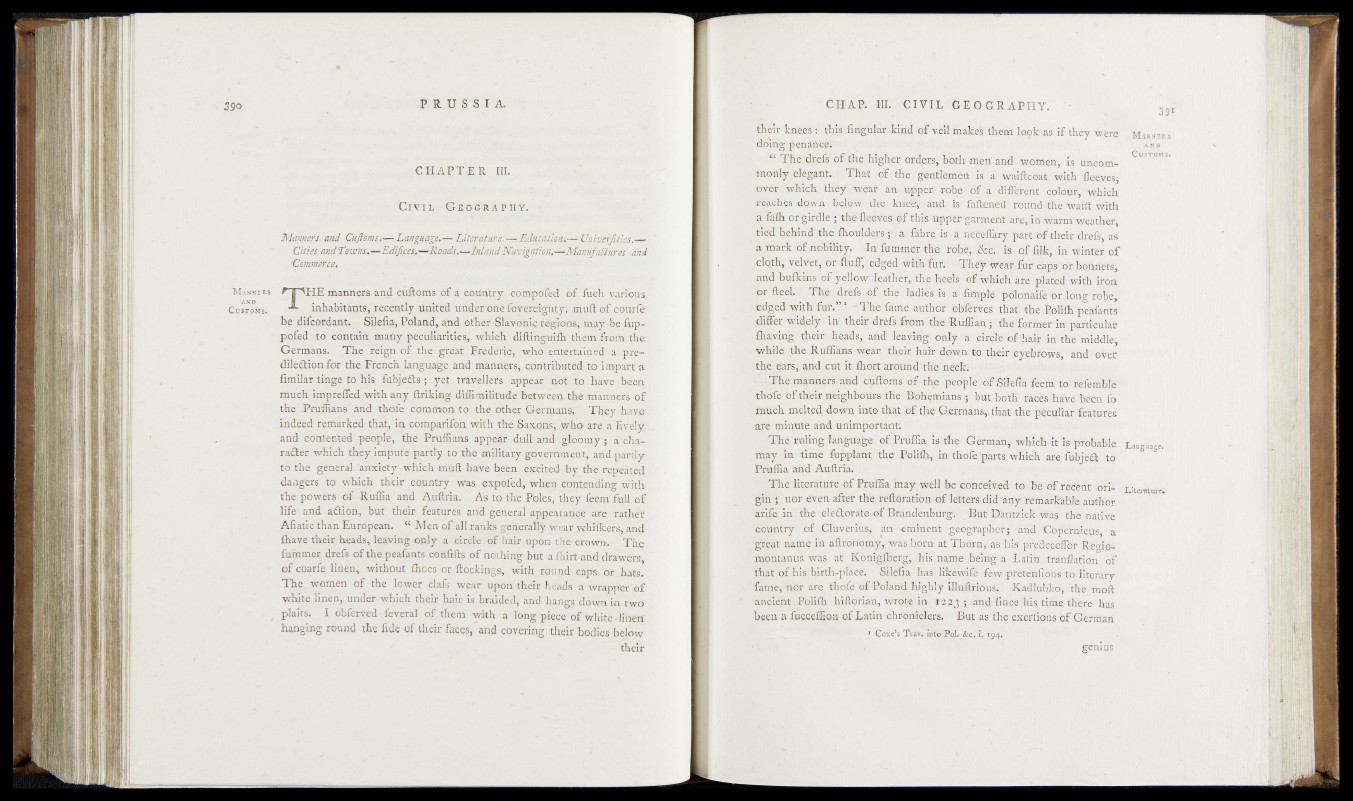
M ansers
and
C ustoms.
( C H, A P T .E R III.,
Civ il 'G e o g r a p è t -, *>
Manners and Cuftams.— Language.— Literature.—-.Education.— Wmverjities._
Cities and Towns.i—Edifices.—Roads.—Inland Navigation.,—Manufactures and
Commerce.
r | ^H E manners and cuftoms o f a c o u n try compofed. o f fuch various
inhabitants, recently united under one fovereignty, muftr'bfeofiffe
be difeordant. Silefia, Poland, andiOtthef fjlavbhipisegionsf may be fûp>-'.
pofed to ' contain man y peculiarities^ which diftinguifh tKeft'frprn
Germans. T h e reign o f th é . great ‘Frederic, who en tf ftained a »prfet
d ile â io n fo r the French language-and manners, contributed to im p a rt a.
fimUar tinge Ço.hîs ■ fubjedts ; y e tr travellers appear' n o t5 to haVe been
m u ch impreffed w ith an y ftriking diflimilitudê between the>niannets'of,>
the Pruffians and thofe common to the other Germans. T h e y h av e
indeed remarked that, in comparifon with the Saxons, who are a lively
and contented people, the Pruffians appear dull and gloomy ; a character
which they impute partly to the military government, and partly
to th e general anxiety which muft have been, excited b y the repeated
dangers to which the ir country was expofed, when contending with
th e powers- o f Ruffia and Auftria. As to the Poles, th ey feem full o f
life and adtion, but their features arid general appearance are rathe?
Afiatic th an European. “ M en o f all ranks generally w ear whifkers, and
fhave their heads, leaving o n ly a c irc le 'o f hair upon the crown. T h e
fummer drefs o f the peafants confifts o f nothing but à fhirt and drawers'
o f coarfe linen, w ithout ffioes or dockings, w ith round caps or hats!
T h e . women o f the lower clafs wear upon th e ir heads a wrapper o f
white linen, under which their hair is braided, and hangs down in two
plaits. I obferved feveral o f them w ith a long piece o f white -linen
hanging rou n d the fide o f their fa c e s /a n d covéring th e ir bodies below
.- their
the ir k n e es: this fingular kind o f veil makes them look a s i f they were
in®ingiBéiAWderiri|.
M “ #!p|ld^fs>df[1?hd high'e^mfdprs-^bdthf^p'and- wqmen, is uaconi-
Hriaonl^i'ègkpt'.r "fT h ^ o f the gèntleipenlkj a Waiftcdat with fleeves;
^ •y ef«which- th ey »Wear a n m p p e ^ ’robg dffaiftifferent colour*,'which
reaches doym '% |^ i» h ! e ', fentee^and isfefellèöed' routfddflie waift with
a fafh or girdle ; the fleeves o f this upper garment are, in warm weather,
tied behindffthe ffi ou‘1 a rieSeökryipart of^theif/drefs, as
^ ark -of mobility. InTóm’m e r ^ e lT d t ó ^ 4 | ^ f é f filk,nin winter o f
CToth1, Vél-vet,- kiMfuff)jfedg€d m T h ^ w e a r fu r dapsfpri'bonrfets,
and brifkins ©^yejldyvhlfeatlief, thevlllêfel^'of wifi’è h a f e ' plated wifh-lron
f ë r/fte e t» _ T h e
- T h e ^ m e author ^bfénTes dhatlkhe-Bolifti peafantst
A f e r -w id e ly in. their-drefs* from d id Ruffian*;^ tkfeifl’i l a e r ^ particular
-'{having th e ir heads, and leaving only a$G$feèffiftHair'im**the middté,
wh'dp the Ruffians wear theic hair dOwnifoitheir eytWows^’-difdrover
thef éarsy gnd cut*it fliort aroundftheTieek.- - 1
i'-*T h é 'mariners and d y ftom ^d f the
ith'ófe o fith tir ü eighbodts the f t g # f s ïl
dripch melted, down into th a t o f th e Germans^, th^tAhe ‘peculiar -features
a re miimtelarid unimportant!
T h e ruling language, o f Pruffia is?the* German^ ’which; ft% i:!prbbabfe
may ill-tim e fupplant th e Polifh, in thbfe’-p a rtsw h ich ’’are.fubleft do
Pfuffia and Auftria.
fF h e lite ra tu re o f pFuffia may well be conceived >to: be 'o f re c e n t-b rii
"gin ; nor* êvien after the reftoratibn o f letters did >a'hyHe mariMbfet ah-fhor
arife in f ïh e èledlora-te o f B randenbiirg^ATut’ ©antziek- wak
c ountry of Cluverius, a n eminent geographer; and Copernicus, a
great name in aftronomy, was born at T h o rn , as his pfedeceffpr Regiomontanus
was at Konigfherg, his name -being a Latin tranllation o f
'th a to f his birth-place. Silefia has like wife few pretenfions to literary
‘fame, n o r a re thofe o f Poland highly illuftrious. -Kadlubko, the rnoft
-ancient Polifh hiftorian, wrote in 1223 5 and fined his time there has
been a fucceffion o f Latin chroniclers. But as the exertions o f G erman
. > Coxc’s Tray, into Pol. &c. i, 194.1
M anners
and
C ustoms.
Language.
Literature.'
genius